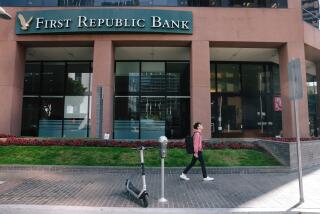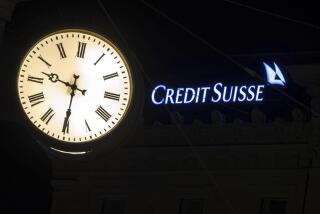Swiss franc’s surge causes turmoil in global financial system
- Share via
Reporting from new york — One of the world’s safest investments — the Swiss franc — swung wildly this week after the central bank in Switzerland announced that it would scrap its policy of limiting the rise of the currency.
It may seem like an arcane move, but it’s not. The Swiss National Bank’s surprise decision Thursday caused the franc to surge against the euro and the dollar, sending shock waves through the global financial system.
Holders of Swiss francs profited handsomely, but many investors and brokerage firms were pounded with losses. Two brokerage firms in London and New Zealand announced huge losses and will have to close.
FXCM Inc. in New York, the largest U.S. retail foreign-exchange brokerage, said Thursday that the movement of the Swiss franc generated “negative equity balances” of $225 million, meaning that its clients owed the firm $225 million. FXCM had to get an emergency $300-million investment from Leucadia National to stay in business.
The turmoil is all the more unsettling because, like U.S. bonds, the dollar and gold, the Swiss franc has been viewed as a haven for investors, thanks to the stability and wealth of the Swiss government.
Since 2011, the Swiss National Bank has had a program to keep its franc from appreciating too much against other currencies — especially the euro, said Ian Gordon, a currency strategist with Bank of America Merrill Lynch.
The franc’s rapid rise makes goods and products produced in Switzerland more expensive and less competitive in other countries. The bank set a limit of 1.20 francs to the euro to keep its rise in check.
After several years, it became untenable for the SNB to keep up its program. The euro is continuing to weaken against other currencies, notably the dollar, and the European Central Bank is likely to start stimulus programs that would weaken the European currency even further.
The SNB decided to allow the market to re-price the franc Thursday. This caused the currency to gain more than 20% against the euro, a historic move.
Because currencies don’t usually move much in a single day, traders often use significant leverage to boost their returns. Leverage of 50 to 1 is not unheard of in the currency market.
The franc is heavily traded, so the SNB’s decision reverberated throughout other currency markets and caused abnormal moves. This left traders exposed to massive losses. Anyone who had bet against the franc, even a little bit, was hit.
Where the losses probably happened were in euros. Here’s an example: A trader invested $100,000 in euros and borrowed 19 times that amount as leverage, or $1.9 million, for a total investment of $2 million in euros. The 5% decline of the euro against the dollar Thursday would have created a $5,000 loss for the investor’s money and a $95,000 loss in the leveraged money. The investor would have lost everything.
Reports also emerged that the SNB’s move inflicted large losses on some of the world’s biggest banks. The Wall Street Journal reported that Citigroup and Deutsche Bank had lost more than $150 million in the turmoil after the bank’s decision.
Mark Costiglio, a spokesman for Citi, declined to comment on the report, as did Deutsche Bank spokeswoman Renee Calabro.
More to Read
Inside the business of entertainment
The Wide Shot brings you news, analysis and insights on everything from streaming wars to production — and what it all means for the future.
You may occasionally receive promotional content from the Los Angeles Times.










